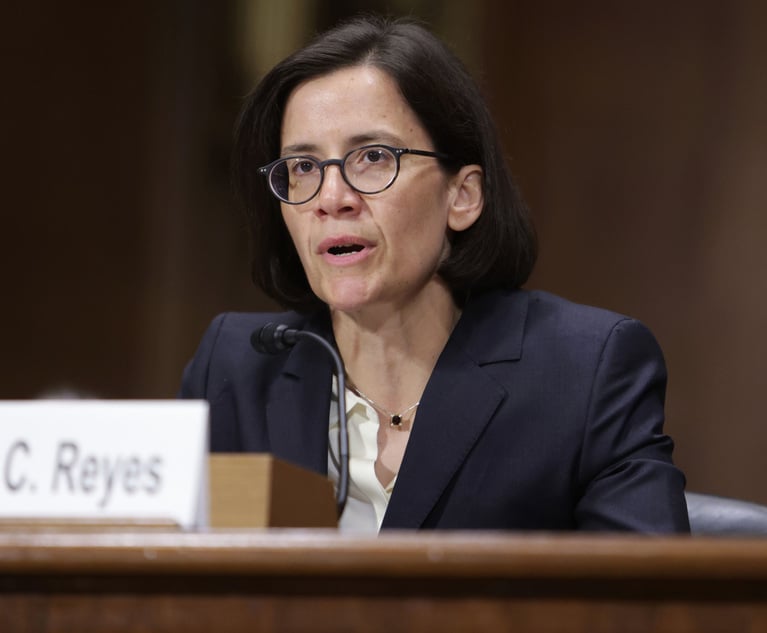SCOTUS Picks Up Case on Web-Focused Trademarks
The U.S. Patent and Trademark Office argues that Booking.com is a generic mark that cannot be registered with the PTO, because it would discourage other booking services from using "booking" as part of their domain names.
November 08, 2019 at 06:05 PM
2 minute read
 Booking.com the system online hotel reservations was founded in Amsterdam in 1996
Booking.com the system online hotel reservations was founded in Amsterdam in 1996
The U.S. Supreme Court agreed today to decide whether generic terms can be trademarked if they're followed by .com or another top-level domain.
The U.S. Patent and Trademark Office argues that Booking.com is a generic mark that cannot be registered with the PTO, because it would discourage other booking services from using "booking" as part of their domain names.
But the U.S. Court of Appeals for the Fourth Circuit ruled that Booking.com is a descriptive mark recognized by many consumers. Over a dissenting opinion, the court ordered the PTO to register it.
The PTO argued in its petition for certiorari that the Federal Circuit has held repeatedly that marks like Hotels.com and Lawyers.com are generic. The government also pointed to the dissenting opinion of Judge James Wynn Jr. of the U.S. Court of Appeals for the Fourth Circuit in Booking.com v. USPTO.
Wynn wrote that the decision "conflicts with the determination that every other court has reached" in similar cases.
Booking.com is represented by Foley & Lardner. The company presented survey evidence before U.S. District Judge Leonie Brinkema of the Eastern District of Virginia that 75% of consumers recognize Booking.com as a brand name. There's no evidence that consumers use "Booking.com" generically, and even the PTO admitted "that it is logically and grammatically impossible to use the name BOOKING.COM as a generic term for anything," Foley partner Jonathan Moskin and associate Eoin Connolly wrote in their opposition in USPTO v. Booking.com.
Judges Robert King and Allyson Duncan of the U.S. Court of Appeals for Fourth Circuit had agreed. They concluded that because trademarks protect only the relevant service—in this case, hotel reservations—"protection over BOOKING.COM would not necessarily preclude another company from using, for example, carbooking.com or flightbooking.com."
This content has been archived. It is available through our partners, LexisNexis® and Bloomberg Law.
To view this content, please continue to their sites.
Not a Lexis Subscriber?
Subscribe Now
Not a Bloomberg Law Subscriber?
Subscribe Now
NOT FOR REPRINT
© 2025 ALM Global, LLC, All Rights Reserved. Request academic re-use from www.copyright.com. All other uses, submit a request to [email protected]. For more information visit Asset & Logo Licensing.
You Might Like
View All

Federal Judge Warns of 'Serious Sanctions' on FDIC Over Document Retention
3 minute read
SEC Sued for Failing to Reveal Records Involving Simpson Thacher Attorney
4 minute read
Trending Stories
Who Got The Work
J. Brugh Lower of Gibbons has entered an appearance for industrial equipment supplier Devco Corporation in a pending trademark infringement lawsuit. The suit, accusing the defendant of selling knock-off Graco products, was filed Dec. 18 in New Jersey District Court by Rivkin Radler on behalf of Graco Inc. and Graco Minnesota. The case, assigned to U.S. District Judge Zahid N. Quraishi, is 3:24-cv-11294, Graco Inc. et al v. Devco Corporation.
Who Got The Work
Rebecca Maller-Stein and Kent A. Yalowitz of Arnold & Porter Kaye Scholer have entered their appearances for Hanaco Venture Capital and its executives, Lior Prosor and David Frankel, in a pending securities lawsuit. The action, filed on Dec. 24 in New York Southern District Court by Zell, Aron & Co. on behalf of Goldeneye Advisors, accuses the defendants of negligently and fraudulently managing the plaintiff's $1 million investment. The case, assigned to U.S. District Judge Vernon S. Broderick, is 1:24-cv-09918, Goldeneye Advisors, LLC v. Hanaco Venture Capital, Ltd. et al.
Who Got The Work
Attorneys from A&O Shearman has stepped in as defense counsel for Toronto-Dominion Bank and other defendants in a pending securities class action. The suit, filed Dec. 11 in New York Southern District Court by Bleichmar Fonti & Auld, accuses the defendants of concealing the bank's 'pervasive' deficiencies in regards to its compliance with the Bank Secrecy Act and the quality of its anti-money laundering controls. The case, assigned to U.S. District Judge Arun Subramanian, is 1:24-cv-09445, Gonzalez v. The Toronto-Dominion Bank et al.
Who Got The Work
Crown Castle International, a Pennsylvania company providing shared communications infrastructure, has turned to Luke D. Wolf of Gordon Rees Scully Mansukhani to fend off a pending breach-of-contract lawsuit. The court action, filed Nov. 25 in Michigan Eastern District Court by Hooper Hathaway PC on behalf of The Town Residences LLC, accuses Crown Castle of failing to transfer approximately $30,000 in utility payments from T-Mobile in breach of a roof-top lease and assignment agreement. The case, assigned to U.S. District Judge Susan K. Declercq, is 2:24-cv-13131, The Town Residences LLC v. T-Mobile US, Inc. et al.
Who Got The Work
Wilfred P. Coronato and Daniel M. Schwartz of McCarter & English have stepped in as defense counsel to Electrolux Home Products Inc. in a pending product liability lawsuit. The court action, filed Nov. 26 in New York Eastern District Court by Poulos Lopiccolo PC and Nagel Rice LLP on behalf of David Stern, alleges that the defendant's refrigerators’ drawers and shelving repeatedly break and fall apart within months after purchase. The case, assigned to U.S. District Judge Joan M. Azrack, is 2:24-cv-08204, Stern v. Electrolux Home Products, Inc.
Featured Firms
Law Offices of Gary Martin Hays & Associates, P.C.
(470) 294-1674
Law Offices of Mark E. Salomone
(857) 444-6468
Smith & Hassler
(713) 739-1250








